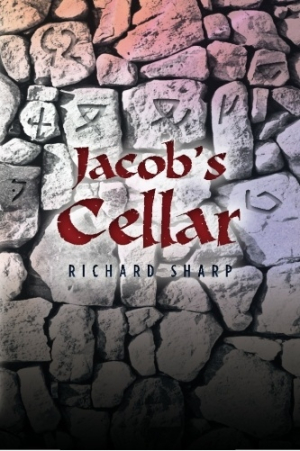
Jacob's Cellar
“History belongs to the one who tells the better story,” old Grandpa Fentress, patriarch of the Ebhart clan, tells his family of hardy Missouri pioneers, as they huddle in the cellar seeking shelter from a storm. That doesn’t mean, he adds coyly, that you can’t “brighten it up with a little invention. Damn it all, if people didn’t make things up, we’d have no history at all.”
That two-part theory of what makes up history is at the core of Richard Sharp’s Jacob’s Cellar. It is the story of an immigrant family, as told by the storytellers within the group—chief among them the blind grandfather. There is a great deal of drama and action in the book, most of which takes place in the basement shelter of the novel’s title and is delivered second- or thirdhand during family gatherings.
The grandfather and others pass on family lore, much of it admittedly embellished or tweaked (often with bits of Edgar Allan Poe or Shakespeare, as the storytellers sometimes admit in more private conversations) to make it more interesting, exciting, or palatable depending on the age and gender of the audience. Some stories date from the time of the American Revolution, others from the great trek westward across the Alleghenies or from the Mexican-American War, but all are told during the years just prior to and during the Civil War.
Sharp’s characters speak that imperfect, regional American English of the place and period. Some characters, notably the grandfather, who was a school teacher, are quite erudite while others seem barely literate. The dialogue feels right, however, no matter who is speaking, and the relationships among the members of this often contentious, multigenerational, and, in parts, inbred brood run the gamut from funny to poignant.
That so much of the action, however, even the battles and challenges which family members go through during the Civil War, is related only through stories and letters does get a bit wearing. The novel intentionally violates the “show me, don’t tell me” rule of literature, and, as such, is in stark contrast to the Micheneresque sagas with which readers of this genre are likely more familiar. As almost everything that happens is told rather than shown or acted out, the book takes on the flavor of either a play or a series of family gatherings. Many readers may be enthralled by this, but others may tire of it, wishing instead to be thrust into the action rather than have it told to them after the fact.
Sharp has done his research on the rugged and dangerous life of these hardy pioneers and the northwest corner of Missouri in which they settled. Those sections concerning family experiences in the numerous wars are particularly well done, especially in the way they relate the daily hardships and tragedies—and not just the glories—of military service. There is also romance, adventure, humor, and sadness in the book, as there is in any family’s story.
Despite the grandfather’s caution about the need to “brighten it up with a little invention,” this is history that is well told, believable, and accurate—with a few things made up just to enliven the telling.
Reviewed by
Mark McLaughlin
Disclosure: This article is not an endorsement, but a review. The publisher of this book provided free copies of the book and paid a small fee to have their book reviewed by a professional reviewer. Foreword Reviews and Clarion Reviews make no guarantee that the publisher will receive a positive review. Foreword Magazine, Inc. is disclosing this in accordance with the Federal Trade Commission’s 16 CFR, Part 255.
